-
ONE CUT OF THE DEAD//KAMERA O TOMERU NO! (Shin'ichirô Ueda 2017)
SHIN'ICHIRÔ UEDA: ONE CUT OF THE DEAD//KAMERA O TOMERU NO! (2017)
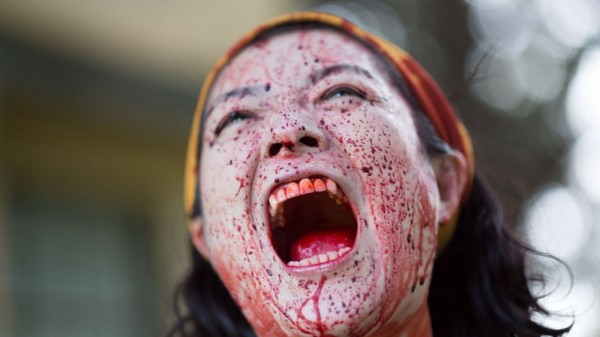
HARUMI SYUHAMA IN ONE CUT OF THE DEAD
TRAILER
Careful with that axe!
This movie plays in an original and hilarious manner with the zombie movie genre. It is also a virtuoso display of self-reflection, a making-of a making-of, and it's in three parts. The first part is the film you saw on TV. Later, we learn that it was shot as the first episode for a new all-zombie channel, in a live broadcast single take - no time for edits - so "one cut" has a double meaning. The premise is this: A director whose claim is being "fast, cheap, but average," is making a zombie movie with a small crew in an abandoned water filtration plant in a remote location. During a break caused by the director's discontent (to put it mildly) with the female young lead Chinatsu (Yuzuki Akiyama) for flubbing 42 takes of the scene where she's threatened by her zombified bf, Ko (Kazuaki Nagaya), real zombies begin to attack, and mayhem ensues. After that the director returns and, heedless of the danger and doom coming on the cast, shoots the attacks of the real zombies with delight, maniacally yelling "Action!"
All this movie was in fact made with virtually unknown actors and on a tiny budget, and part of its charm lies in its revelation of Japanese teamwork and artisanal ingenuity.
The whole first segment, ending with the title and credits for "One Cut of the Dead," is a tour-de-force nearly forty-minute take. That cheap zombie movie shoot that turns real is just the beginning.
Part two, set one month earlier, loses the energy and ferocity of the first part, but modulates into a homier, more self-conscious mood. It's from the point of view of the director, Higurashi (Takayuki Hamatsu) and shows his family life, then how he got hired to do the movie, and its peculiar demands. We learn that his wife Nao (Harumi Syuhama) is an actress who's stopped acting, but comes to his shoots, and that his daughter, Mao (Mao) who comes for the rehearsals and later is recruited into the cast, has a crush on the young man in "One Cut's" cast, Ko, apparently a heartthrob, who emerges as a prima donna. What this segment lacks in excitement it makes up on gemütlichkeit. It humanizes the whole affair and takes us to the human stories behind the making-of that is to follow.
At the last minute, the actress who is to play the older woman can't make it, and Higurashi's retired actress wife Nao steps in. The actor who is to play the director can't make it either, and Higurashi is forced to play the make-believe director as well as the real one. One of the crew members who turns into a zombie, we learn, is an alcoholic who needs a drink to stop his hands from shaking, but if he has one, risks passing out. Another cast member (and make-believe crew member) has something like irritable bowel syndrome, and must be reassured that there will be "port-a-loos" brought in, as the facility has no restrooms.
Now we begin the third part, the complete "making of," of the film we saw in part one, which we fully appreciate now that we understand, as we must, that this has to be by-the-skin-of-your-teeth guerrilla filmmaking at its most demanding. It's a tribute to Ueda that as everything goes wrong in the shoot and the cast brilliantly improvises, you half expect something to go so terribly wrong that a cast member will actually get his or her head or arm hacked off. There are multiple axes in play.
The third segment is the most important, and the most complete, but our appreciation of it entirely depends on our having seen the film as it appeared broadcast on TV. Not only do we see the cast running around in "One Cut of the Dead" T shirts moving equipment, splashing blood, and inserting fake chopped-off heads and limbs. We also observe the tribulations of the cast member with the loose bowel problem and the effort necessary to make him appear when the script calls for it. The director must personally revive the drunken actor.
The hilarity is lightened by the production's success in spite of every malfunction and missed cue. As the TV people watch remotely, things repeatedly go wrong. Yet the cast's improvisations are more gonzo and original than the original script - to which they always return, like a masterful pianist picking up the theme of a concerto after the cadenza. The drunk's wobbly condition makes him an excellent zombie, once they can get him standing up. It's nice to see the prima donna turn into a team player who improvises brilliantly, and it is astonishing to find out why the director's wife is so impressive and even scary as the older woman in the cast.
One Cut of the Dead /カメラを止めるな! Kamera o tomeru na! ("Do not stop the camera!"), 93 mins., opened in Japan 9 Nov. 2017. It gained international notice at Udine and has been in nine international festivals, including the New York Asian Film Festival, as part of which it was screened for this review, showing 13 Jul. 2018 at 10:20 p.m.
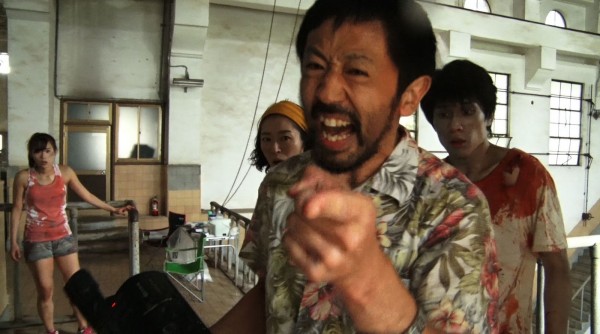
TAKAYUKI HAMATSU, FOREGROUND, IN ONE CUT OF THE DEAD, WITH YUZUKI AKIYAMA, HARUMI SYUHAMA, KAZUAKI NAGAYA
Last edited by Chris Knipp; 07-03-2018 at 01:15 AM.
-
CROSSROADS: ONE TWO JAGA (Nam Ron 2018)
NAM RON: CROSSROADS: ONE TWO JAGA (2018)
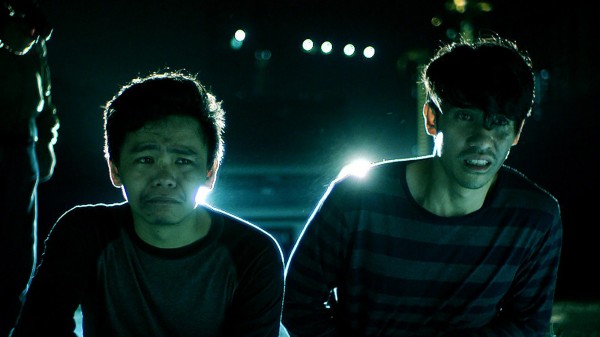
Eeny meeny, mene mene
Malaysian filmmaker Nam Ron’s third feature is a messy little movie all seen through yellow filters, that aims to show that corruption is everywhere. A longhaired guy carries out his more powerful father's dirty work, starting with burning the body of a worker who died in a fall. He takes a kid along with him who wants to be tough. His older brother hides his sister at a sleazy hotel while arranging for her to return home, because she hates working here. She has lost her passport. Their are other subplots, too many. The main focus is a corrupt cop going around with his new young partner, only 23, whose face is twisted into a scowl of distaste at all the bribes and payoffs he sees. The rookie tries to remain pure, but he turns out to be a loose canon whose desire to play by the rules leads only to tragedy.
The framing scene shows the rookie, but we don't know him yet, after a beating by interrogator. The next shot is of kids playing a Malaysian "Eeny, meeny, miny, moe" game that separates cops from robbers, both emblematic of how the two are indistinguishable, and referring to the boy, Jaga, who will be caught up in all the mess. The director, Nam Ron, deserves credit for juggling his excessive number of small plot lines clearly enough, for those who are capable of taking them all in. There are too many, though, and a third of them should have been left on the cutting room floor. The trouble is, we don't care deeply about anybody except, briefly, for the rookie cop, who, like everybody else, betrays out trust.
The film uses Indonesia’s Ario Bayu (Buffalo Boys) and the Philippines’ Timothy Castillo (Neomanila) playing illegal immigrants. (NYAFF festival blurb.)
See David Pountain's review on FILMDO (penned at the Udine Far East Festival).
Crossroads: One Two Jaga/One Two Jaga, 80 mins., debuted at Udine 22 Apr. 2018, also showing at Shanghai 16 Jun. It was screened for this review as part of the New York Asian Film Festival, where it shows 29 Jun.
Last edited by Chris Knipp; 07-08-2018 at 11:25 AM.
-
MICROHABITAT (Jeon Go-woon 2017)
JEON GO-WOON: MICROHABITAT/SO-GONG-NYEO (2017)
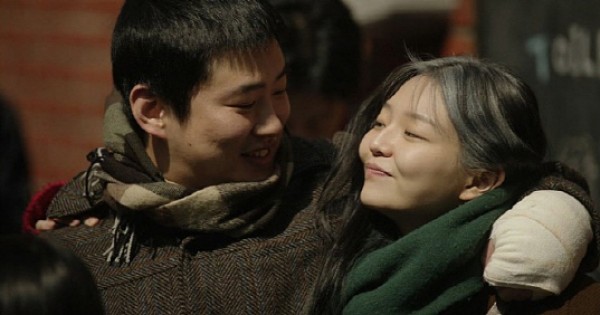
AHN JAE-HONG AND ESOM IN MICROHABITAT
A winter's tale
Microhabitat is a Korean debut feature by a woman director who's part of an independent collective called Gwanghwamun Cinema. It's a unique, meditative character study as well as a series of vignettes that serve as a small panorama of a variety of Seoul lifestyles and economic situations. But it doesn't come off as quite so cold and formal as that sounds. It's governed by the unpredictability of Miso (Esom, Lee So-young), an independent, freewheeling woman of 31. When we first meet her she's working as the housekeeper of a well-off young woman, who treats her as a friend.
Then, Miso discovers the price of a pack of cigarettes has just gone up 80%. It turns out her other essential indulgence is single malt scotch. She considers her carefully allocated finances, and makes the radical decision of moving out of her tiny flat, whose rent has also just gone up $100. She parts on friendly terms with her landlord, who's none too well off himself; the rent on his apartment has just gone up $150.
Miso is now homeless, but she can afford to smoke and order a glass of good whisky in a bar. She's a spartan kind of sybarite. An IMDb plot outline says she suffers from a deep depression that she assuages with chain smoking and heavy drinking. That is not in the least true, and just shows how Miso's nonconformity can be misread. She is a bohemian. Later, when people whom we've seen her serially visit in the film gather several years later for a funeral and talk about her, they speak with admiration of her good cooking, her skill as a housekeeper, the two dozen eggs she arrived with, and the way she "dressed in layers," which seemed "chic then."
Miso is a mystery. But she has a boyfriend (Ahn Jae-hong, a regular of the Gwanghwamun Cinema productions), who's a cartoonist. They are very much in love, though rough digs and a cold Seoul winter cause them to put off having sex till spring. Then, he springs a disappointing but practical surprise: he is giving up cartooning, to "live like a normal person," and has volunteered for a job in Saudi Arabia that will last for two years, so he can save up a lot of money, $50,000, he calculates.
Living with less as she does already, being without her boyfriend for two years is really tough. But Miso is never daunted, never saddened. She smiles, she copes. Each stay with someone - a brother and a sister, neither of whom is as happy as she is by a long shot, a lonely man who lives with his parents, a former classmate who was once needy, but now married to a rich guy. She has a healthy baby boy, and a Freudian slip suggests he may be a torture as much as a joy. When Miso joins her husband for a smoke after dinner, she reveals her insecurity.
Each visit shows us a different "habitat," a different house or interior and lifestyle. And one of the film's triumphs is a scene where an agent shows Miso a series of increasingly disastrous possible rentals, each one with a worse window with a worse view, higher up in one of the poorest and cheapest parts of Seoul. Each of the vignettes makes a perfectly turned little short story that is at once a sly, often droll psychological study and a look at current Korean manners and economics. And all the while this is a flowing portrait of the free spirit, living on the edge, that is Miso. This is a wise, comical, meditative debut that makes for enjoyable watching. There are little flaws. Some of the transitions are abrupt, the editing is a bit rough. And the English subtitles need some polishing. An interesting film, though, and a budget production that looks great.
Microhabitat / 소공녀 (So-gong-nyeo,"A Little Princess"), 106 mins., debuted at Busan Oct. 2017, opening in Korea 22 Mar. 2018. It was screened for this review as part of the New York Asian Film Festival at Lincoln Center, where it shows 10 Jul. 2018 at 6:30 p.m.
The film was reviewed at Busan by Pierce Conran for Screen Anarchy.
Last edited by Chris Knipp; 06-21-2018 at 10:15 PM.
-
RESPETO (Treb Monteras 2017)
TREB MONTERAS (ALBERTO MONTERAS II): RESPETO (2017)
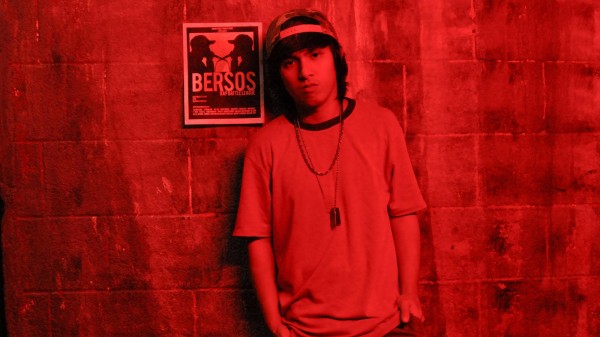
ABRA IN RESPETO
The Philippines seeks a voice and finds a cycle of violence
Respeto begins as a hiphop coming-of-age movie, a sort of Filipino Eight Mile whose protagonist, Hendrix (Abra), comes from the very poor down-and-dirty world of the Pandacan slums, the underside of Manila, in which underground rap is the new anthem-maker. But first time filmmaker Alberto Monteras II has things to say about every aspect of the Philippines. Rap is only one voice of a story about politics and society. The oppressive Duterte regime is awakening in older Filipinos horrifying memories of the days of Marcos' dictatorship they thought they had gotten rid of. Monteras and his cowriter Njel De Mesa weave this movie into a powerful myth of ongoing conflict and cruelty.
Petty crime brings Hendrix close to Doc (Dido De La Paz), one of those older Filipinos, a bookseller and protest poet during Marcos, whom Hendrix first tries to rob and then adopts as a mentor. It turns out Doc was a practitioner of balagtasan, a Filipino art of debate conducted in verse, so he was a kind of ancestor rapper.
Hendrix lives with his sister Connie (Thea Yrastorza) and her boyfriend Mando (Brian Arda), and robs the latter to have money to enter the big local "Versus" rap contest, the movie's first big noisy vérité scene, since like Eight Mile, real rappers are used. He goes first, so we know he's going to lose. He fails miserably, trying to better a large female rapper opponent Luxuria with crude fat jokes. She easily destroys him and he is so daunted he pisses himself, which makes him notorious.
Then with his sidekicks Betchai (Chai Fonacier) and Payaso (Yves Bagadion) he conceives the idea of robbing Doc to repay his sister's boyfriend. Thus another world enters his life. The movie is in no hurry. Gradually it emerges that 'Drix's sister and boyfriend are selling drugs and use him as their runner. Getting to know Doc through repairing damage they cause breaking in, Hendrix steals a notebook of poetry and uses lines for his raps. But Doc, who may have early stage dementia, and turns out to have suffered traumatically under Marcos, is watching Hendrix and sees worth in him.
As we learn more about Doc he reveals that his family was abused by Marcos' government thugs and though he smashed one of them in the head with a rock, it felt ineffectual. A parallel was struck early on when at a club Hendrix sees his love Candy (Kate Alejandrino) raped by his perfidious rival Breezy G (Loonie) and can do nothing to stop it. And this mirrors the nation forced to watch impotent as two brutal regimes wreck havoc. In this context while rap contests like Versus are clearly a place where the urban poor can raise a loud voice, they're not seen as saving anything but instead, like the current regime, only play with more conflict, the drug lords bringing awful violence, and the vicious cycle going on.
Sometimes Respeto seems mired in the vulgarity and crude humor of a third world B-picture. On the other hand local reviewers fall into the airy generalizations of a term paper. It's hard to explain how Monteras welds mud into a meaningful shape, and his movie is so deeply vernacular no outsider can appreciate the message of its constant wordplay. But imperfect as it is, Respeto has more meaning and emotion in it than other more polished entries in the festival, and means a great deal to many Filipino viewers.
From Susan Claire Agbayani in Rappeler we learn that "National Artist for Literature Bienvenido Lumbera, and poets Vim Nadera (who had a cameo in the Balagtasan scene in the movie), Frank Rivera and Mark Angeles contributed poems to the film," as well as that actual Filipino rappers Mike Swift, Apekz, Abbaddon, J Skeelz, Mike Kosa and M-Zhayt and female rap artist Luxuria" perform in the Versus scenes speaking their own lines.
This feisty little movie won several awards including Best Picture at the Cinemalaya Philippine Independent Film Festival and received a ten-minute standing ovation Aug. 2017, and was released theatrically in the Philippines in Sept. 2017. It surprised and pleased the filmmakers by also winning awards at Cyprus, and it gained more international attention with a Rotterdam screening. It was screened for this review as part of NYAFF, where it shows at 7:30 p.m. on 14 July 2018.
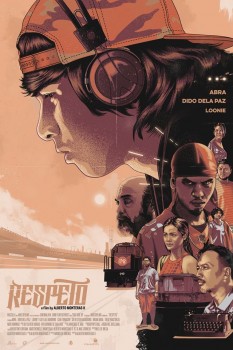
Poster by V.Aseo and M.Lazarte (from Esquire)
Last edited by Chris Knipp; 06-29-2018 at 05:01 PM.
-
River’s Edge Isao Yukisada (2018)
ISAO YUKISADA: RIVER'S EDGE (2018)F

FUMI NIKAIDO AND RYÔ YOSHIKAWA IN RIVER'S EDGE
Angsty and chic Japanese high school drama set in 1994
Ichiru Yamada (Ryô Yoshizawa) is the formerly bullied, closeted gay friend of Haruna, the main character (Fumi Nikaido), whose dreams of UFOs doubtless owe something to Gregg Araki's Mysterious Skin , but everything in Isao Yukisada's River's Edge is adapted from a popular manga strip by Kyoko Okazaki. This must explain its appeal to an adolescent audience and also the shallowness of the characters. The title, "Ribâzu ejji" in the original, a transliteration of the English, references the more tightly plotted 1986 American movie that helped bring Crispin Glover and Keanu Reeves to public notice. Perhaps this is nostalgic for Japanese forty-somethings? The veteran director Isao Yukisada is now 49.
Ichiiru is still bullied, because Haruna rescues him locked naked in a locker. His victimizer is her own boyfriend, the tall, longhaired wild boy Kannonzaki (Shuhei Uesugi). There is also Kozue Yoshikawa (Sumiru), a bulimic classmate who is in TV ads. Ichiru dates the naive Kanna (Aoi Morikawa), who's unaware that he's gay, just thinks he's "fashionable and mysterious" (using the English word 'mysterious'). Only Haruna knows. Kannonzaki is having sex and snorting coke with the class slut, Rumi (Shiori Doi) - leading to a couple of surprisingly graphic sex scenes. The sequence where Ichiru takes Haruna out into the high grass to show her the decayed corpse he has discovered a year or so ago, having shared this secret earlier with Yoshikawa (they call each other by last names), may evoke Gregg Araki. Araki's Apocalypse Trilogy is more vivid, more fun, but less cool and chic than River's Edge. This film has a ghoulish side, but is also funny; it makes sense to call it a "tragicomedy."
These are Tokyo sophisticates, yet the atmosphere, the "river's edge" being rough and industrial, is also rather seedy. Rather than developing a coherent plot (though there is plenty of action 3/4 of the way through), the manga narrative seems more designed to show what urban Japanese high schoolers were up to in the Nineties, which could be a revelation for the younger and more naive, and titillation for the older who may have missed out on some of this, or anyway are past it now. But no one would want to be up to all these things, which are both idiotic and terrible. We are witness to crimes. It's manga.
River's Edge / リバーズ・エッジ ("Ribâzu ejji"), 118 mins., debuted in the Panorama section of the Berlinale 15 Feb. 2018 and opened in Japan the next day. It also had festival showings at Hong Kong, South Korea's Jeonju International Festival and Nippon Collection in Germany. It was screened for this review as part of the 2018 New York Asian Film Festival, where it shows 3 Jul. 2018 at 6:30 pm. Jonathan Romney wrote a Screen Daily review from Berlin.
Last edited by Chris Knipp; 07-16-2018 at 11:25 PM.
-
LOOKING FOR LUCKY (Jiang Jiachen 2017)
JIANG JIACHEN: LOOKING FOR LUCKY
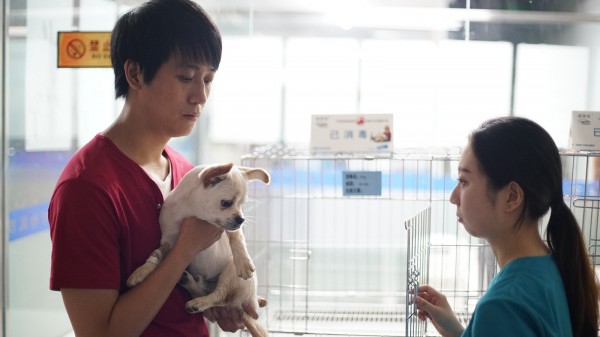
DING XINHE (LEFT) IN LOOKING FOR LUCKY
Getting ahead and falling behind
Looking for Lucky is a Chinese comedy-satire about contentiousness and insecurity. The latter exists for nearly all of us, particularly millennials, in a world where there are hardly any truly secure jobs anymore. In fact this film is so realistic, if ramped-up, and anxious, it's hard to see it as a comedy at times. Nonetheless if may have wide appeal, and Jiang Jiachen stands out in his first feature for his original methods and style.
Though the film speaks to today's universal insecurity, it uses very specific regional details of Chinese and more precisely northeastern Chinese culture and language. The director says that in Shenyang, the big city in northeastern China that's his hometown and the setting, "people argue continuously." The continuous quarreling involves everybody. As elsewhere in China, bribes are carefully calibrated, even refereed by the police. If you cause any harm that may be actionable, an immediate payoff is expected, and advisable.
This issue comes up immediately, and maybe nothing quite matches the opening sequence for comedy, or absurd heightening of Shenyang argumentativeness. Zhang Guangsheng (Ding Xinhe), about to finish his master's degree after three years, has been taking care of his Professor, "Old Niu's," white bulldog, Lucky (certainly an ironic name for him). As somebody pointedly declares later, Guangsheng is Old Niu's dog himself. He's momentarily put the care of the dog in the hands of his father (Yu Hai), a laid-off factory worker. A fat woman with a squalling little boy is accusing Guangsheng's father of allowing the dog to bite the kid's finger. The father begs to differ. A little crowd has gathered. Everyone is shouting at the top of their lungs. The dog, however, has disappeared. Guangsheng's father didn't have it on a leash and has let it get out of his sight.
When Guangsheng arrives, he is immediately in a panic. He vociferously blames his father for his negligence. Guangsheng and his father are continually arguing through most of the movie. But this is a father-son buddy picture. Before the end, the dad's true caring emerges from beneath the contentiousness. Guangsheng's panic leads him into other traps and payoffs besides the fat lady. His (also fat, and comedic-intense) printshop owning buddy insists he must offer a reward for a finder of the dog, and when the notice goes up, some scammers offer a whitish bulldog, then force him to take it by threatening to eat it if he doesn't.
For contrast, view, if you can, French comic maaster Étienne Chatiliez's 2001 comedy Tanguy. That too is about a graduate student whose future is uncertain, and is full of feelings of anxiety, sometimes on the part of the student, Tanguy, more often on that his beleaguered dear maman and papà. His speciality, incidentally, is Chinese. Chatilliez's highly-crafted film maintains a light atmosphere even when the parents are being driven nutty by their pretentious, though exemplary, son who just never seems to be going to move out and leave them in peace. But the posh bourgeois setting of Tanguy and its elaborately constructed, and more leisurely, scenes allow the viewer more breathing room to enjoy the fun at an enjoyable remove, even though stay-at-home adult children are becoming more familiar in the first world.
In his director's statement for Hong Kong the thirty-four-year-old director lays claim to "a sense of absurdness" in his premise of "a young guy" who is "looking for a dog and a job upon graduation." There is confidence and intensity in Jiang's Cassavetes-style improvisation and a structure that disappears in the action. But it is the 61 long takes of unrelieved nervous action whose exhausting intensity makes it harder to see this movie as laughable or a satire because the comedy is so high strung.
The dog serves as a symbol of subservience, the subservience of Guangsheng to his professor, the subservience of everyone, especially millennials, to the system. Guangsheng's vague love interest - though he's too busy being servile to his professor to pursue it, if that were even allowable - is a young female student in his year who turns out to have her own way of getting ahead. As the film brings in fellow students Jiang's strong sense of the milieu and particularly of economic factors comes through even more. Though Guangsheng departs for some job as a finale and Old Niu has been suitably dealt with, Looking for Lucky isn't about resolution. It's about the problem, and the absurdities and extremes it leads people into.
Looking for Lucky debuted at Hong Kong (see listing), also showing at Shanghai, receiving the Asian New Talent Award and two nominations there. It was screened for this review as part of the NYAFF, showing 8 July at 2:30 PM.
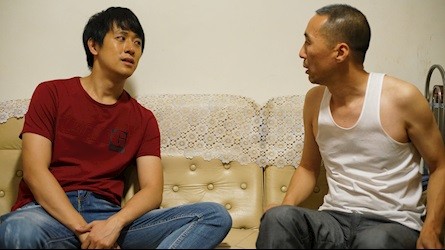
DING XINHE AND YU HAI IN LOOKING FOR LUCKY
Last edited by Chris Knipp; 07-03-2018 at 12:09 AM.
-
OLD BEAST/LAO SHOU (Jhou Ziyang 2017)
JHOU ZIYANG: OLD BEAST/LAO SHOU (2017)
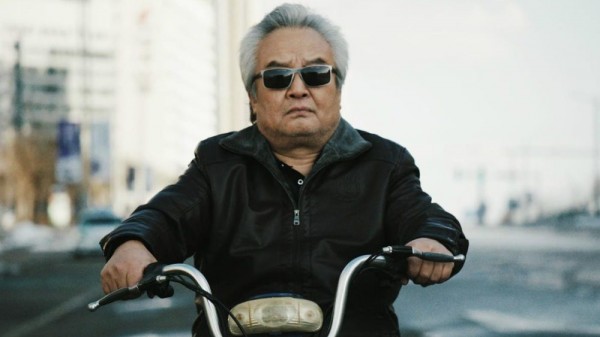
TU MEN IN OLD BEAST
Family relations
Lao Yang (Tu Men), the center of this tale, is a despicable sixty-something pater familias who at first just seems a wretch. His wife is dying in the hospital and he is lavishing expensive gifts on his mistress and grandson and blowing cash at cheesy massage parlors and Mahjong dives. And it gets worse. His married siblings wrangle over the cost of an operation for his wife, their mother, and when they reluctantly agree and put money together, he steals it and blows it. Then an old shepherd buddy leaves him his camel, which is awaiting the vet, and he sells the camel and pawns his little motorbike to buy a cow, which he fobs off on his naive friend as more profitable than the camel. The family are so angry they lock him in a cellar. But cell phones are wonderful, and he gets the police to let him out, and sues his family. That, later, he regrets, when he wins.
But in this beautifully photographed film (by Belgian China resident Matthias Delvaux) with its compelling lead performance there is more than just the picture of an aging rogue digging himself into a deep dark hole. This is a grim watch but also a complex and original one - even if its picture of modern China, with its failed new city and squabbling, mercenary and selfish youngsters, is not so unusual.
The setting plays a constant role. It is the city of Ordos. And therein lie Lao Yang's extenuating circumstances. In Inner Mongolia, it's perhaps the government's most spectacular failure among its new towns to resettle populations in (hopefully) growing industrial areas. It's a vast cluster of old slums and abandoned new highrise developments laced with grandiose statuary. As Lao Yang tools around on his little motorbike, with his small, plump body and big head topped with a grand mound of pearly gray hair, his bravely youthful leather jacket and pseudo-stylish sunglasses, the Neverland of failed urban development hovers with mocking indifference behind him.
Here, real estate collapsed, and Lao Yang was in real estate. But before that decline of his fortunes, he was successful, and from his manner, probably powerful (the actor, Tu Men, once notably played Genghis Khan). He worked hard to get his children educations and set them up with careers and spouses. Now, they don't need him. In this context, his dissolute behavior is an act of protest in the face of ingratitude. The spouses of the children are chillier than the children themselves. These general facts either you know or you figure out, in watching. They are embedded in the action, emerging in remarks Lao Yang makes. "You don't like Lao Yang?" this movie says: "Well, just look at the rest of his family." There's no one to like.
At first, with his late night gambling and his outer polish and mask of white hair Lao Yang made me think of Roger Duchesne in Jean-Pierre Melville's Bob le Flambeur. But Bob is a benevolent, failed crook, whose gambling hurts nobody. His elegance doesn't get tarnished. He is nice to his concierge. Still Lao Yang is an unusual choice of protagonist and he makes you cast around. Later as events stayed gloomy and got darker and Lao Yang got blood on his nose and mud on his shoes, my thoughts turned to the films of Robert Bresson. But that won't work either because here the struggling is menial and never ennobling as in Bresson.
There are indications in this feature debut that Jhou Ziyang is a quite original voice. He has found a unique point of view in this unlikable protagonist, and a specific place in this big hulk of a city.
What is Lao Yang doing at the end when he returns home to care for his dying wife? Has he reformed? Has he repented? Or has he merely found the only comfortable birth for himself and a new maliciousness behind a new mask? At times he has only his cigarettes and his flip phone, and his cigarettes are rumpled and his flip phone is losing power. Lao Yang is one of the loneliest men in Chinese cinema. And that's something to see.
Old Beast / 老獸 Lǎo shòu ("Old Beast"), 108 mins., first appeared in July 2017 at Xining, then was noticed at Tokyo in Oct., and Taipei in Nov. and it was reviewed by Richard Kuipers in Variety and Clarence Tsui in Hollywood Reporter. It won three prizes and four nominations, getting the FIPRESCI Prize, Best Actor, and Best Screenplay (and Zhou penned his own screenplay) at Taiwan's Golden Horse awards. It received theatrical releases in China (Dec. 2017) and Taiwan (Jan. 2018), with other festival showings (Miami, Singapore); it was screened for this review as part of the New York Asian Film Festival at Lincoln Center, where it shows Tues., 3 Jul. 2018 at 9 p.m.
Last edited by Chris Knipp; 07-01-2018 at 09:53 AM.
 Posting Permissions
Posting Permissions
- You may not post new threads
- You may not post replies
- You may not post attachments
- You may not edit your posts
-
Forum Rules






 Reply With Quote
Reply With Quote








Bookmarks